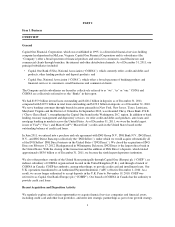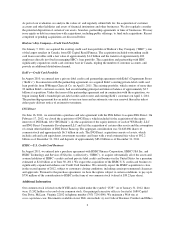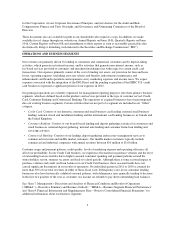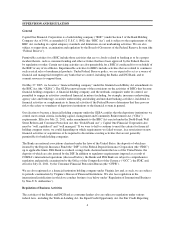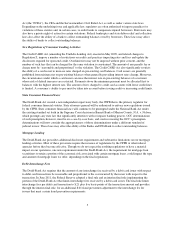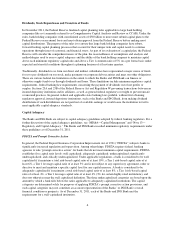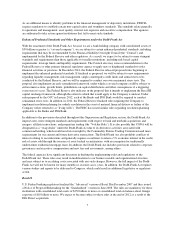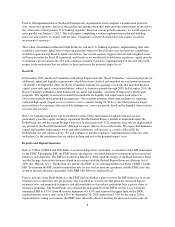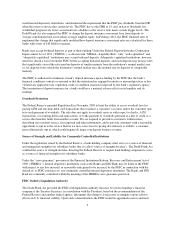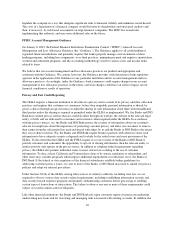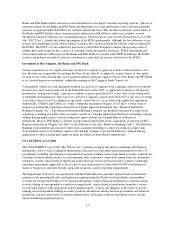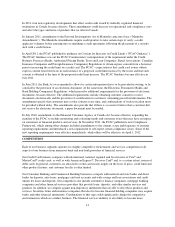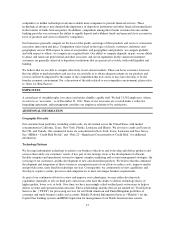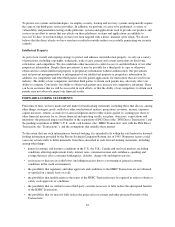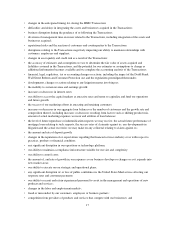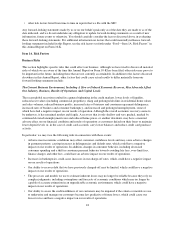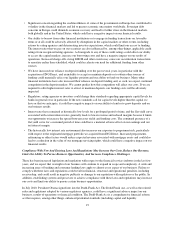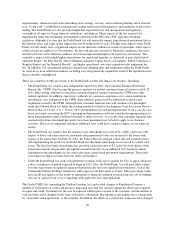Capital One 2011 Annual Report Download - page 31
Download and view the complete annual report
Please find page 31 of the 2011 Capital One annual report below. You can navigate through the pages in the report by either clicking on the pages listed below, or by using the keyword search tool below to find specific information within the annual report.Banks and ING Bank furnish customer account information to the major consumer reporting agencies. The use of
consumer reports by the Banks and ING Bank and furnishing of account information to the consumer reporting
agencies is regulated under the FCRA on a uniform, nationwide basis. This includes restrictions on the ability of
the Banks and ING Bank to share consumer report information with affiliates and to use customer account
information shared by affiliates for a marketing purpose. The Fair and Accurate Credit Transactions Act of 2003
(the “FACT Act”), extends the federal preemption of the FCRA permanently, although the law authorizes states
to enact laws regulating certain subject matters so long as they are not inconsistent with the conduct required by
the FCRA. The FACT Act also added new provisions to the FCRA designed to address the growing crime of
identity theft and to improve the accuracy of consumer credit information. Generally, FCRA rulemaking and
enforcement authority with respect to the Banks and ING Bank now resides with CFPB. In addition, the FCRA
creates a limited private right of action for consumers to seek relief for certain violations for the FCRA.
Investment in the Company, the Banks and ING Bank
Certain acquisitions of our capital stock may be subject to regulatory approval or notice under federal or state
law. Investors are responsible for ensuring that they do not, directly or indirectly, acquire shares of our capital
stock in excess of the amount that can be acquired without regulatory approval. Each of the Banks and ING Bank
is an “insured depository institution” within the meaning of the Change in Bank Control Act.
Consequently, federal law and regulations prohibit any person or company from acquiring control of us without,
in most cases, prior written approval of the Federal Reserve or the OCC, as applicable. Control is conclusively
presumed if, among other things, a person or company acquires more than 25% of any class of our voting stock.
A rebuttable presumption of control arises if a person or company acquires more than 10% of any class of voting
stock and is subject to any of a number of specified “control factors” as set forth in the applicable regulations.
Additionally, COBNA and CONA are “banks” within the meaning of Chapter 13 of Title 6.1 of the Code of
Virginia governing the acquisition of interests in Virginia financial institutions (the “Financial Institution
Holding Company Act”). The Financial Institution Holding Company Act prohibits any person or entity from
acquiring, or making any public offer to acquire, control of a Virginia financial institution or its holding company
without making application to, and receiving prior approval from, the Virginia Bureau of Financial
Institutions. Because ING Bank is a federal savings bank located in Delaware, acquisitions of interests in ING
Bank are governed by Chapter 8 of Title 5 of the Delaware Code (the “Delaware Banking Code”). The Delaware
Banking Code prohibits any person or entity from acquiring ownership or control of a federal savings bank
located in Delaware, or its holding company if its holding company is located in Delaware, without making
application to, and receiving prior approval from, the Delaware State Bank Commissioner.
USA PATRIOT Act of 2001
The USA PATRIOT Act of 2001 (the “Patriot Act”) contains sweeping anti-money laundering and financial
transparency laws as well as enhanced information collection tools and enforcement mechanisms for the U.S.
government, including: due diligence requirements for private banking and correspondent accounts; standards for
verifying customer identification at account opening; rules to promote cooperation among financial institutions,
regulators, and law enforcement in identifying parties that may be involved in terrorism or money laundering;
reporting requirements applicable to the receipt of coins and currency of more than $10,000 in nonfinancial
trades or businesses; and more broadly applicable suspicious activity reporting requirements.
The Department of Treasury, in consultation with the Federal Reserve and other federal financial institution
regulators, has promulgated rules and regulations implementing the Patriot Act that prohibit correspondent
accounts for foreign shell banks at U.S. financial institutions; require financial institutions to maintain certain
records relating to correspondent accounts for foreign banks; require financial institutions to produce certain
records upon request of the appropriate federal banking agency; require due diligence with respect to private
banking and correspondent banking accounts; facilitate information sharing between government and financial
institutions; require verification of customer identification; and require financial institutions to have an anti-
money laundering program in place.
11


